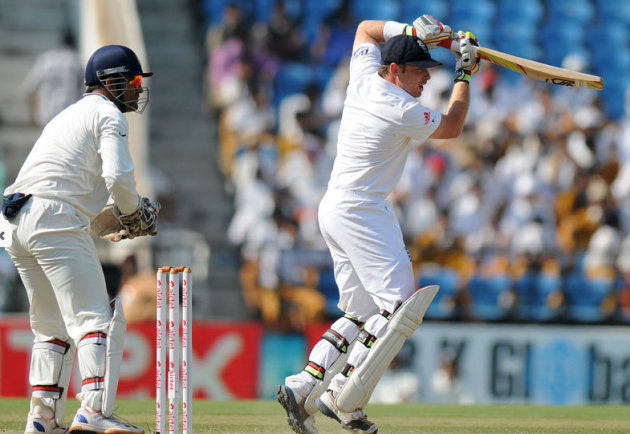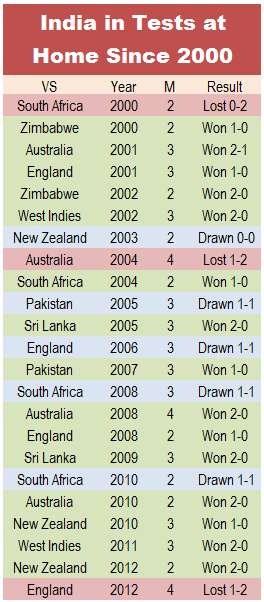India lose a home Test series for the first time in 8 years.
 Ian Bell finally rung in the riches for England with an unbeaten century on the final day.
Ian Bell finally rung in the riches for England with an unbeaten century on the final day.NAGPUR: England made history at the Jamtha stadium as they completed an epochal away series victory over India on Monday to lift the Anthony de Mello Trophy, the first time they had done so since David Gower’s team won in 1984-85 on the sub continent. Jonathan Trott and Ian Bellcompleted centuries to thwart India on the final day, as India failed to get the early wickets they so desperately needed to enforce a result.
The 2-1 verdict in favour of England was never in doubt once the two had added 208 runs without so much as giving a chance to the home team. Truth be told, there was a chance offered – of Bell on 75, against Chawla and dropped by Virender Sehwag - but it was too little, too late. And were it not for the series at stake, the day would have made for dreadful watching. It did now too, but the sideplots kept up the intrigue partly. India’s only chance was to take a flurry of early wickets. England’s aim was to take the lead beyond an outside chance of a successful Indian chase. No prizes for guessing which team succeeded.
Play was called off when England declared on 352/4, leading by 356 and with just 15 overs to go in the day’s play. India were able to take just one wicket through two-and-a-half toiling sessions – that of Trott for 143 – but that was all the success they tasted. Bell was unbeaten on 116 in the end, and thus ended India’s eight-year run of being unbeaten in Tests at home. They had last lost to Australia in 2004-05.
Monumental win
 It was a monumental series for England. They were deprived of practice against spin by a vengeful BCCI; lost the opening Test at Ahmedabad, and were then promised wickets that would turn square from the first day in the remaining matches. It appeared as if this would be just another whinging group of from the British Isles who’d get royally walloped like so many earlier touring parties. But Alastair Cook, the series top-scorer, and Kevin Pietersen, the talisman, turned it all around at Mumbai.
It was a monumental series for England. They were deprived of practice against spin by a vengeful BCCI; lost the opening Test at Ahmedabad, and were then promised wickets that would turn square from the first day in the remaining matches. It appeared as if this would be just another whinging group of from the British Isles who’d get royally walloped like so many earlier touring parties. But Alastair Cook, the series top-scorer, and Kevin Pietersen, the talisman, turned it all around at Mumbai.At the Wankhede, the captain struck yet another hundred and Pietersen possibly the most attacking century by a visiting batsman in India, as the tables turned radically. Monty Panesar, who had been erroneously omitted from the Ahmedabad match, returned at the Wankheded to roaring success. For the first time in a long time, England were treating India like India had treated touring teams – bat big and spin out the opposition – and this despite Cook losing the tosses at Mumbai and Kolkata.
What should also be noted is that England’s dressing room was not the most pleasant spot to be in following Pietersen’s texting scandal during the recent South African series. The contest against India was supposed to test the strength of the ‘reintegration’ process that Pietersen and the team – Cook especially – were supposed to be going through. It is in this light that the series win is elevated to another level.
Danger signsBefore England start praising themselves to the skies, they’d do well to factor in the quality of the opposition. A team recently shorn of two key Test batsmen, containing another non-performing mammoth, bereft of a pace battery and short on quality spin – India were not quite the gargantuans at home that people have recently branded them to be. It was a series to forget for the hosts. They continued to turn a blind eye on away results and remained hopeful of letting doctored pitches take care of the home series. It was a policy that cost them dear. Aside from Cheteshwar Pujara, the batting was a failure.
Sehwag got a hundred, Virat Kohli came into the runs in the last Test, as did skipper MS Dhoni, but the kind of patient partnerships that were the hallmark of England’s performance were acutely absent. What was even more alarming was the ineffectiveness of the spinners, even as Panesar and Graeme Swann ran circles around the Indians. Pragyan Ojha took 20 wickets, but R. Ashwin was sporadic, far more experimental than he was threatening and more of a success with the bat than with the ball. Lack of runs on the board forced Dhoni into defensive tactics and it did not help that his captaincy – if not his place in the team itself – was on the line. Added to it all was the case of Sachin Tendulkar, whose degraded returns turned whispers of his retirement into palpable cries for his ouster.
With an ODI and Twenty20 series against Pakistan looming, India will soon return to formats they now seem most comfortable in. After that, England revisit for their ODI leg, and it is only later next year that Australia will drop in for four Test matches. Don't be surprised if success in the shorter games shifts the focus yet again from the grave matters that ail Indian cricket. Some things never change, but we always knew that!
No comments:
Post a Comment